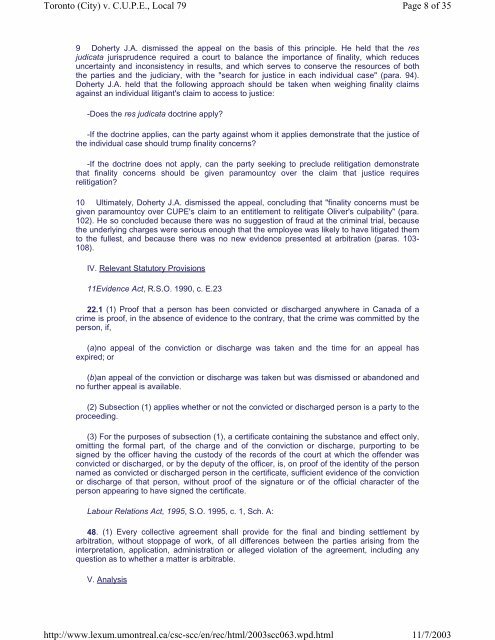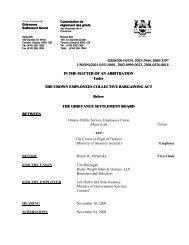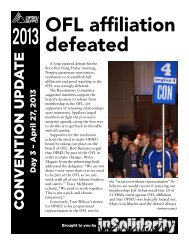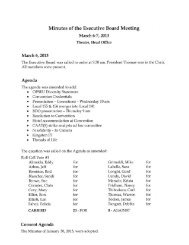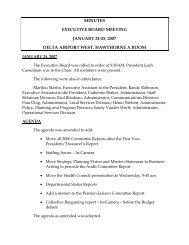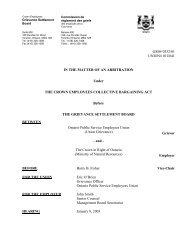C.U.P.E., Local 79 v. Toronto (City) .pdf - OPSEU
C.U.P.E., Local 79 v. Toronto (City) .pdf - OPSEU
C.U.P.E., Local 79 v. Toronto (City) .pdf - OPSEU
Create successful ePaper yourself
Turn your PDF publications into a flip-book with our unique Google optimized e-Paper software.
<strong>Toronto</strong> (<strong>City</strong>) v. C.U.P.E., <strong>Local</strong> <strong>79</strong><br />
http://www.lexum.umontreal.ca/csc-scc/en/rec/html/2003scc063.wpd.html<br />
Page 8 of 35<br />
11/7/2003<br />
9 Doherty J.A. dismissed the appeal on the basis of this principle. He held that the res<br />
judicata jurisprudence required a court to balance the importance of finality, which reduces<br />
uncertainty and inconsistency in results, and which serves to conserve the resources of both<br />
the parties and the judiciary, with the "search for justice in each individual case" (para. 94).<br />
Doherty J.A. held that the following approach should be taken when weighing finality claims<br />
against an individual litigant's claim to access to justice:<br />
-Does the res judicata doctrine apply<br />
-If the doctrine applies, can the party against whom it applies demonstrate that the justice of<br />
the individual case should trump finality concerns<br />
-If the doctrine does not apply, can the party seeking to preclude relitigation demonstrate<br />
that finality concerns should be given paramountcy over the claim that justice requires<br />
relitigation<br />
10 Ultimately, Doherty J.A. dismissed the appeal, concluding that "finality concerns must be<br />
given paramountcy over CUPE's claim to an entitlement to relitigate Oliver's culpability" (para.<br />
102). He so concluded because there was no suggestion of fraud at the criminal trial, because<br />
the underlying charges were serious enough that the employee was likely to have litigated them<br />
to the fullest, and because there was no new evidence presented at arbitration (paras. 103-<br />
108).<br />
IV. Relevant Statutory Provisions<br />
11Evidence Act, R.S.O. 1990, c. E.23<br />
22.1 (1) Proof that a person has been convicted or discharged anywhere in Canada of a<br />
crime is proof, in the absence of evidence to the contrary, that the crime was committed by the<br />
person, if,<br />
(a)no appeal of the conviction or discharge was taken and the time for an appeal has<br />
expired; or<br />
(b)an appeal of the conviction or discharge was taken but was dismissed or abandoned and<br />
no further appeal is available.<br />
(2) Subsection (1) applies whether or not the convicted or discharged person is a party to the<br />
proceeding.<br />
(3) For the purposes of subsection (1), a certificate containing the substance and effect only,<br />
omitting the formal part, of the charge and of the conviction or discharge, purporting to be<br />
signed by the officer having the custody of the records of the court at which the offender was<br />
convicted or discharged, or by the deputy of the officer, is, on proof of the identity of the person<br />
named as convicted or discharged person in the certificate, sufficient evidence of the conviction<br />
or discharge of that person, without proof of the signature or of the official character of the<br />
person appearing to have signed the certificate.<br />
Labour Relations Act, 1995, S.O. 1995, c. 1, Sch. A:<br />
48. (1) Every collective agreement shall provide for the final and binding settlement by<br />
arbitration, without stoppage of work, of all differences between the parties arising from the<br />
interpretation, application, administration or alleged violation of the agreement, including any<br />
question as to whether a matter is arbitrable.<br />
V. Analysis


